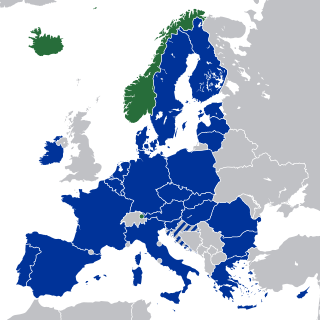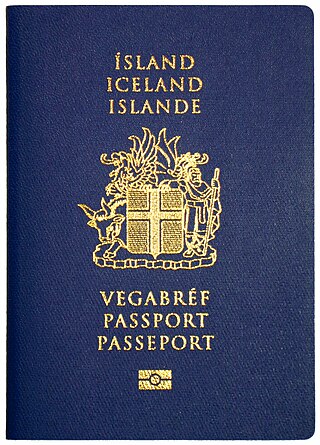
A societas Europaea is a public company registered in accordance with the corporate law of the European Union (EU), introduced in 2004 with the Council Regulation on the Statute for a European Company. Such a company may more easily transfer to or merge with companies in other member states.

The European Economic Area (EEA) was established via the Agreement on the European Economic Area, an international agreement which enables the extension of the European Union's single market to member states of the European Free Trade Association. The EEA links the EU member states and three of the four EFTA states into an internal market governed by the same basic rules. These rules aim to enable free movement of persons, goods, services, and capital within the European single market, including the freedom to choose residence in any country within this area. The EEA was established on 1 January 1994 upon entry into force of the EEA Agreement. The contracting parties are the EU, its member states, and Iceland, Liechtenstein, and Norway. New members of EFTA would not automatically become party to the EEA Agreement, as each EFTA State decides on its own whether it applies to be party to the EEA Agreement or not. According to Article 128 of the EEA Agreement, "any European State becoming a member of the Community shall, and the Swiss Confederation or any European State becoming a member of EFTA may, apply to become a party to this Agreement. It shall address its application to the EEA Council." EFTA does not envisage political integration. It does not issue legislation, nor does it establish a customs union. Schengen is not a part of the EEA Agreement. However, all of the four EFTA States participate in Schengen and Dublin through bilateral agreements. They all apply the provisions of the relevant Acquis.

A European political party, known formally as a political party at European level and informally as a Europarty, is a type of political party organisation operating transnationally in Europe and within the institutions of the European Union (EU). They are regulated and funded by EU Regulation No. 1141/2014 on European Political Parties and European Political Foundations and their operations are supervised by the EU Authority for European Political Parties and European Political Foundations. European political parties – usually consisting of national parties, not individuals – have the right to campaign during the European elections, for which purpose they adopt manifestos outlining their positions and ambitions. Ahead of the elections, some of them designate their preferred candidate to be the next President of the European Commission. In the European Parliament they work with more or less corresponding political groups and their MEPs. Europarties influence the decision-making process of the European Council through coordination meetings with their affiliated heads of state and government. They also work closely and co-ordinate with their affiliated members of the European Commission.

The agencies of the European Union are bodies of the European Union and the Euratom established as juridical persons through secondary EU legislation and tasked with a specific narrow field of work.
Società per azioni is a form of corporation in Italy, meaning "company with shares". It is more or less equivalent to S.A. or public limited company (PLC) in other countries.
The freedom of movement for workers is a policy chapter of the acquis communautaire of the European Union. The free movement of workers means that nationals of any member state of the European Union can take up an employment in another member state on the same conditions as the nationals of that particular member state. In particular, no discrimination based on nationality is allowed. It is part of the free movement of persons and one of the four economic freedoms: free movement of goods, services, labour and capital. Article 45 TFEU states that:
- Freedom of movement for workers shall be secured within the Community.
- Such freedom of movement shall entail the abolition of any discrimination based on nationality between workers of the Member States as regards employment, remuneration and other conditions of work and employment.
- It shall entail the right, subject to limitations justified on grounds of public policy, public security or public health:
- The provisions of this article shall not apply to employment in the public service.
Home state regulation is a principle in the law of the European Union for resolving conflict of laws between Member States when dealing with cross-border selling or marketing of goods and services. The principle states that, where an action or service is performed in one country but received in another, the applicable law is the law of the country where the action or service is performed. It is also called home country control, country of origin rule, or country of origin principle. It is one possible rule of EU law, specifically of European Single Market law, that determines which laws will apply to goods or services that cross the border of Member States.

The Roaming Regulation 2022 bans roaming charges (Eurotariff) within the European Economic Area (EEA), which consists of the member states of the European Union, Iceland, Liechtenstein and Norway. This regulates both the charges mobile network operator can impose on its subscribers for using telephone and data services outside of the network's member state, and the wholesale rates networks can charge each other to allow their subscribers access to each other's networks. The 2012 Regulation was recast in 2022.

The Citizens' Rights Directive 2004/38/EC sets out the conditions for the exercise of the right of free movement for citizens of the European Economic Area (EEA), which includes the member states of the European Union (EU) and the three European Free Trade Association (EFTA) members Iceland, Norway and Liechtenstein. Switzerland, which is a member of EFTA but not of the EEA, is not bound by the Directive but rather has a separate multilateral sectoral agreement on free movement with the EU and its member states.

The Schengen Area is an area encompassing 27 European countries that have officially abolished border controls at their mutual borders. Being an element within the wider area of freedom, security and justice policy of the European Union (EU), it mostly functions as a single jurisdiction under a common visa policy for international travel purposes. The area is named after the 1985 Schengen Agreement and the 1990 Schengen Convention, both signed in Schengen, Luxembourg.

European organisational law is a part of European Union law, which concerns the formation, operation and insolvency of public bodies, partnerships, corporations and foundations in the entire European Union. There is no substantive European company law as such, although a host of minimum standards are applicable to companies throughout the European Union. All member states continue to operate separate companies acts, which are amended from time to time to comply with EU Directives and Regulations. There is, however, also the option of businesses to incorporate as a Societas Europaea (SE), which allows a company to operate across all member states.
The European Union's Third Energy Package is a legislative package for an internal gas and electricity market in the European Union. Its purpose is to further open up the gas and electricity markets in the European Union. The package was proposed by the European Commission in September 2007, and adopted by the European Parliament and the Council of the European Union in July 2009. It entered into force on 3 September 2009.
The Employee Involvement Directive 2001/86/EC is an EU Directive concerning the right of workers to elect members of the board of directors in a European Company. It is a supplement to the European Company Regulation and inspired by the European Works Council Directive.

The Treaties of the European Union are a set of international treaties between the European Union (EU) member states which sets out the EU's constitutional basis. They establish the various EU institutions together with their remit, procedures and objectives. The EU can only act within the competences granted to it through these treaties and amendment to the treaties requires the agreement and ratification of every single signatory.

European company law is the part of European Union law which concerns the formation, operation and insolvency of companies in the European Union. The EU creates minimum standards for companies throughout the EU, and has its own corporate forms. All member states continue to operate separate companies acts, which are amended from time to time to comply with EU Directives and Regulations. There is, however, also the option of businesses to incorporate as a Societas Europaea (SE), which allows a company to operate across all member states.

Passports of the EFTA member states are passports issued by the European Free Trade Association (EFTA) member states Iceland, Liechtenstein, Norway and Switzerland. EFTA is in this article used as a common name for these countries.







